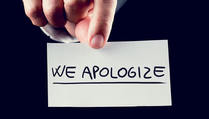
United Airlines blew it--twice. First, when employees summoned the police to forcibly remove a passenger with a ticket and boarding pass to make room for a United employee. Second, when the CEO bungled the corporate response by making it appear that United was somehow the victim and the passenger the wrongdoer. The incident may have cost the company tens of millions of dollars in revenues and damage to its reputation.

The Basic Rules of Apologizing
1. Fully acknowledge the wrong done and your (or the company's) responsibility for it. 2. Say "I'm sorry." Period. Don't explain. Don't offer excuses. Don't say "I'm sorry if . . . " Don't say "I'm sorry but . . ." Don't ask for forgiveness. Don't ask for anything in return. 3. Mean it. Be sincere. Or don't do it. A false apology is insulting. 4. Demonstrate that you've taken steps to prevent the misconduct in the future. An Apology is a Gift With an apology, you attempt to return the injured party's dignity, face, status--in short, what the harm took away. If your actions caused physical or financial injury, you will need to make up for that as well. But the harm to the sense of self, the humiliation of disrespect, can be made right only through a sincere, heartfelt apology. Sincere Apologies are Part of a Healthy Society Reconciliation is essential to healthy social interaction. It is wrong to screw up. It is worse to pretend we didn't. The failure to acknowledge our fault and to offer an apology keeps the harm alive. Primatologists like Frans de Wahl have shown that our evolutionary ancestors reach out to each other to make amends, to reconcile, after a fight. Failing to do so keeps the fight alive, re-injures the victim, and eats away at the wrong doer. Corporations Can Apologize At the beginning of A Civil Action one of the victims of corporate pollution tells her lawyer she wants the corporation to apologize. He responds by saying, "Money is the wy corporations apologize." No, it isn't. Money helps fix and make up for some of the harm done. But it is not an apology. In Japan, the CEO of an airline that caused great harm went to the house of each victim and personally apologized--and then he resigned. In America, a CEO is not likely to resign, but the CEO can personally apologize to the victim of corporate wrongdoing as well. Will the CEO of United apologize to the passenger in person? And he can. He should. The CEO should also explain what United is doing to make sure other customers are not similarly mistreated in the future. In sexual harassment cases, for example, the company leadership should demonstrate that it has put an effective workplace harassment prevention program in place and will act swiftly to remove any employee who crosses the line. Sorry Works About 20 years ago, I represented a couple whose child died two weeks after an overdose of Prednisone put her in a coma. The medical staff had screwed up. But the couple was not seeking money. All they wanted was the explanation of what went wrong that the attending physician promised he would give them. But he clammed up and for two years did not even return their phone calls. No doubt he was afraid that providing an explanation and apologizing for the life-threatening mistake would put him in jeopardy of a lawsuit. Not long after this case, Doug Wojcieszak founded Sorry Works, a movement to get states to enact legislation that allows hospitals and physicians to explain and apologize without having the apology used against them in court. Medical malpractice suits decline when hospitals adopt Sorry Works programs. See, e.g., Jennifer Robbennolt, Apologies and Medical Error. The Mediation Experience Mediators know that sincere apologies by corporate representatives help settle lawsuits. There is even evidence that plaintiffs relax their financial demands when they have received an apology. Corporations could teach their leaders how to apologize. If reconciliation becomes part of a company's culture, the overall health and prosperity of the company is likely to improve. And there will be fewer legal claims as well. Apologies and Legal Risk Management Prevention is the best cure. But when things go wrong, the next step in legal risk management is to keep the dispute from escalating into a lawsuit. Recognition and acknowledgement of the problem, promptly and properly apologizing, and making amends go a long way to getting things right and reducing financial exposure. Win Before Trial's Legal Risk Management Program includes training on corporate apologies. Contact us for more information.
2 Comments
Leave a Reply. |
About The Proactive Client
Categories
All
Archives |
Programs |
|

 RSS Feed
RSS Feed